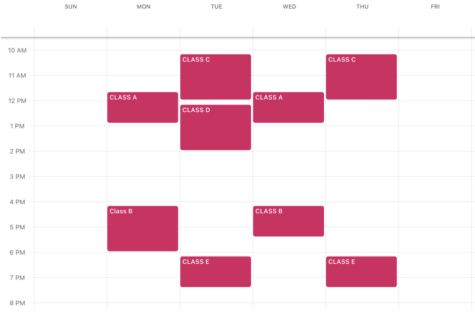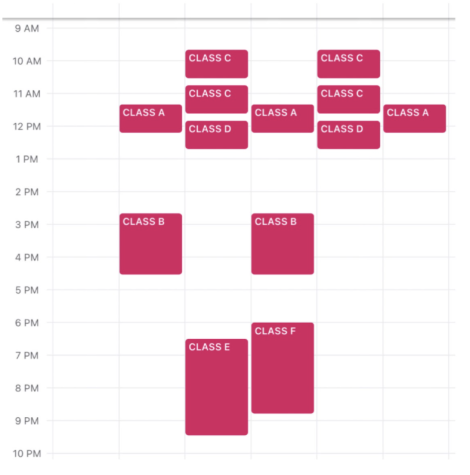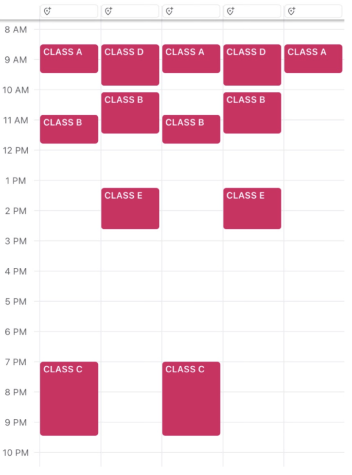What You Need To Know About College vs. High School From Students of the Class of 2021
January 24, 2022
Grace Song: My name is Grace Song. I am a freshman at Columbia University studying English, and I’ll be applying for a business management concentration in sophomore year.

Shalin Madan: My name is Shalin Madan. I’m a freshman at Hofstra, and I am enrolled in the Bachelor of Science and Doctor of Medicine degree (BS MD) program. I basically applied for college and medical school at the same time.

Sheryl Huang: My name is Sheryl Huang. I’m a freshman at Binghamton University. I’m currently undecided, but I’m definitely leaning towards STEM.

Three students from the class of 2021 reflect on their high school experience and share about their transition to college. Even though a large part of high school consists of preparing for college, we aren’t always thoroughly informed on what “college” is. Feel free to read this entire article, but here are alternative ways to read this article that can be more helpful for you:
- Look for a person’s experience at their school.
- Scroll down to a topic that you’d like to read more about.
- Adjusting To College
- Day In The Life
- College vs. High School Classes
- Creating Your Schedule
- Extracurriculars
- Living In A Dorm
- Preparing For College
- Advice
Adjusting To College
Grace: I think it was a little overwhelming at first during orientation [especially as an introvert] because everyone was just shopping around for friends. But I think once everything calmed down and classes started, I sort of found my friend group naturally.
Shalin: I would say academically it was a very smooth transition coming from South. Socially, I think it’s always a pretty big deal to move away from home, but I think that once you’re in the environment you get used to it pretty quickly.
Sheryl: I think it’s been challenging [from being virtual for a year and a half to in-person], but it’s also been fun to have a little bit more freedom and get to have new experiences, especially in person.
Day In The Life
Grace: I wake up at 8. I get breakfast at nine, sometimes with friends, and then usually I have two-three classes in a day. So on Tuesdays, I have class from 10:10-12:00, and then 12:00-2:00, and then I get lunch. I might do some work afterwards, or I might prepare for my other classes and then shower, go to my night class [6:10-7:25]. Then I’ll probably get dinner with friends, either before or after my class. Then for the night, I’ll just do homework or I’ll be working my job.
Shalin: I wake up as late as I can, right before class. I’ll have biology class, then I’ll get some time to do work or just relax for two hours. Then I’ll have chemistry, get more time to do work, and then I have a chem lab. We have science labs [on Tuesday and Wednesday] from 7:00 PM until 8:50, so they’re pretty late. After that, it’s just a mix of working and hanging out with people.
Sheryl: I wake up around 7:30 to 8:00, and I just get ready and go to class. After that, I have a couple of hours to myself, so I usually get food, try to do some homework. I’m also part of the orchestra here, so I usually attend those rehearsals in the evening. Usually when I come back, I’ll do my night routine and then get ready for bed.
College vs. High School Classes
Q: How many hours a week would you estimate you’re in class? (High school – 32.5 hours a week)
Grace, Shalin, Sheryl: Around 15-16 hours a week.
Q: How have college classes been different from high school classes? How is the workload?
Grace: I’m taking lots of humanities courses, so it’s not a lot of testing, it’s more reading and writing. I only had one midterm and it was for my one math class. Doing both STEM and art classes in high school [helped give me] a good foundation. Although STEM doesn’t necessarily help me in humanities, I have to take a science class for the core [curriculum], so having some background in science has helped me.
Shalin: I get homework much less frequently. Compared to what I’m used to from South, Hofstra undergrad is much easier, it’s much less time consuming. It gives me a lot of time to be with other people.
Sheryl: You only have 4 classes, but it’s a lot more work because there’s a lot more reading and writing involved. The materials are a lot more dense, and [instructors] go through concepts really quickly because they have to fit everything into four months. I [do] have a lot more [unstructured] time, so I go out once in a while with friends, get food with friends, and do work together.
Creating Your Schedule
Q: What are your thoughts on how high school is scheduled?
Grace: I have classes that are 1-2 hours long, so high school classes would definitely feel shorter to me now. I much prefer the way that college is run; you’re not sitting in a building for 6 hours straight. I also don’t have classes on Friday.
Shalin: I think that having shorter classes has benefits and drawbacks. Students probably like shorter periods because people’s attention spans are not that long. I’d say if you’re really trying to pack in information and teach as quickly as possible, longer class periods would be better, something like an hour and a half or two hours.
Sheryl: One thing that always bothered me was how I had to wake up at 6:30 and get to my bus at 7:10 only to wait in school for more than half an hour for classes to start. Then I remember being really involved in after school stuff. I feel like it was a much more rigid schedule because it was more structured, but there’s also less time for yourself.
Q: What are the benefits of having longer but less frequent classes?
Grace: It did take a little while to get used to the new length because it was so much longer, so it was a little exhausting for me in the beginning. The amount that you learn feels a lot more.
Sheryl: I think the benefit of that is it gives you more time in between classes to kind of review the material, but it’s also kind of bad because if you don’t touch your notes, or look at the lecture in between, then you’ll forget what you learned. It gives you more time to do the homework [and to] get help if you need it.
Q: How do you feel about the way college is scheduled?
Grace: There’s a lot more freedom. There’s no one telling you where you should go, where you should be, what you should be doing. It’s really independent, self-led, and I like that freedom.
Sheryl: It’s definitely a lot more independent. In college, you register for courses so you basically build your own schedule.
You usually hear [high school] teachers say how in college you have to plan everything yourself, professors aren’t going to spoon feed you, and that’s pretty accurate. They do give you a lot of resources. It requires a lot more pacing out in the 4 months, and making sure that you’re on top of deadlines, and also knowing when you need to ask for help.
In high school, there are extra help days, and if you have something at that time and you can’t make it, then there’s not much you can do about that. But for college they’re a lot more flexible. [Professors] have office hours multiple days of the week at different times, so you can work it around your schedule.
Extracurriculars
Q: How are clubs in college different from those in high school?
Grace: There are a lot of clubs to choose from, way more than high school, and most people are in at least one or two clubs. Getting leadership roles is quite competitive. I got rejected by both literary magazines on campus.
Shalin: [In my experience] college clubs are just very lenient and relaxed so in a way it can be good but we also felt no need to [join the clubs].
Sheryl: They’re similar in a lot of aspects. It is a lot more competitive because there’s a lot more people. Upperclassmen are generally going to take up more of the spots because they have more experience. At Binghamton, there’s a cheese club, and I heard it’s just going there and eating cheese. So there are things that are a lot more selective and competitive but there’s also clubs for you to hang out and meet new people.
Living In A Dorm
Q: How has living in a dorm been for you?
Grace: I like my single and how it belongs to me. Every morning I see the sun rise over the buildings and it’s pretty nice. I’m in the “quiet” dorm, but we have singles and air conditioning (which other dorms don’t have).
Shalin: I’m in a suite, which is two doubles connected by a small lounge, with a small couch and a TV. A lot of people do random roommates; I didn’t do random roommates because I had already met a few people in my program on zoom, so we had planned to room together. I think first year being in a dorm is very important because it allows you to connect a lot more to the people around you, and it’s just much easier to make friends that way.
Sheryl: You always hear horror stories about roommates, [but] I got really lucky. I didn’t meet my roommate until the first day we moved in. We just clicked and we communicate really well.
Preparing For College
Q: Are there any skills you developed in high school that have helped you manage the increase in freedom in college?
Grace: I knew how to manage my time well in high school. That is really important to have even more so in college, [like] pacing myself when it comes to writing essays, not procrastinating until the last second but writing your essay in chunks.
Shalin: I think it’s a good way for people to learn how much time they need to finish everything, because they’re given a block of 7 hours. You learn how many extracurriculars you can fit in, what else you can do, and how much time you need to work and study.
Sheryl: The class periods gave you an idea of how much time you’re dedicating to each class. After school activities also take up time where you could be doing work or studying. I think learning to manage your studies into the time that you do have at home is really important. When I had free periods throughout the day, I would study or do homework then, which I have carried over because I usually have time in between my classes now.
Q: What habits were you able to develop in high school that you’ve carried into college?
Shalin: Learning how to study efficiently. There are a lot of people who study for a 100 on a test, but I don’t see the point in that because as you study the effectiveness of that time applied decreases. I was able to enjoy life more going for a 95, 96, and accepting you might not get everything right, but not adding all that extra time.
People aren’t putting enough work into understanding why. If you memorize but then forget on a test, you’re screwed because you’re fully betting on memorization, and memorization takes longer than just trying to understand why something happened. Then if you forget something, you can still understand what’s happening and then apply what you learned.
Sheryl: I really figured out [how to study] in junior and senior year because I learned that making study guides rather than just looking over the notes helped me, so knowing what format works best for you.
Advice
Q: How do you balance a school and social life now that they’re in one place?
Grace: You know the triangle that’s academic, friends, sleep, and people say you can only choose two of them? That’s not true, you can have all three.
I sleep before twelve, I wake up at 8. A lot of my friends go to bed later than me, so sometimes when I go to bed early there is a sort of FOMO. But what’s important to me is my health, and I know that if I don’t sleep I’m going to regret it the next day. I’m going to feel tired, and I’m not going to pay attention in class.You want to have boundaries, you want to have standards for yourself. You want to prioritize the things that are important to you.
Q: Is there anything you would like to tell the class of 2022 about as they head into the college scene soon?
Grace: Don’t stress too much. Enjoy your senior year. I think that college is what you make of it, not necessarily the name. It’s about the opportunities you take and the work that you do there.
Shalin: [You’ve] definitely worked hard enough to get to the places they want to go. You might not realize this until you get to college, but compared to the community at South, you are rarely going to have a time when you’re surrounded by that many diligent, hardworking, smart people. It just shows you how valuable the education was [at South], because I think when you’re experiencing it, it’s so [hard to appreciate it]. When you realize after the fact that I know how to study, I know what I’m doing, and a lot of people are just grasping onto it, you start appreciating it a lot more.
Sheryl: Honestly, just best of luck. Especially because right now is the height of college applications, just keep your options open. I think when I was applying, I was like, “Oh, I have to get somewhere good.” I think I realized pretty late in the process there’s always options, like you can transfer, you can change your major. So just don’t be too stressed out about it and put forth your best effort. College, even though it seems very daunting, is a challenging transition, but it’s fun.






